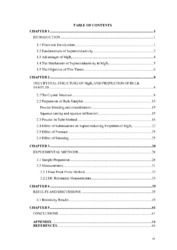Please use this identifier to cite or link to this item:
https://hdl.handle.net/11147/3032Full metadata record
| DC Field | Value | Language |
|---|---|---|
| dc.contributor.advisor | Özyüzer, Lütfi | - |
| dc.contributor.author | Günel, Aylin | - |
| dc.date.accessioned | 2014-07-22T13:50:45Z | - |
| dc.date.available | 2014-07-22T13:50:45Z | - |
| dc.date.issued | 2003 | - |
| dc.identifier.uri | http://hdl.handle.net/11147/3032 | - |
| dc.description | Thesis (Master)--Izmir Institute of Technology, Physics, Izmir, 2003 | en_US |
| dc.description | Includes bibliographical references (leaves: 66-72) | en_US |
| dc.description | Text in English; Abstract: Turkish and English | en_US |
| dc.description | viii, 72 leaves | en_US |
| dc.description.abstract | The brittleness of recently discovered superconductor MgB2 requires novel technique to prepare them as a superconducting wire. In this study, the metal matrix composites consisting of Mg and MgB2 were fabricated by uniaxial hot pressing with a pressure application of 0.5 GPa. While some of the composite pellets was exposed to a heat treatment at 400 0C, the other samples prepared by a heat treatment at 500 0C. One of the samples in each group was a pure pellet of commercially available powders and the others include excess Mg with 5wt %, 10wt %, 15wt % and 20wt % of the MgB2 powders in the pure pellets. X-ray results illustrate that the initial excess Mg consitutient is still present in the final metal matrix composite in unreacted form, which is what we wanted. Microstructural studies performed by SEM and EDX indicate the possible presence of secondary phases like MgB4, MgB6 and MgO in very small amounts. While the MgB4 and MgB6 probably originated from the initial commercial MgB2 powder, the concentration of MgO might be increased with the heat treatment. Microstructural studies also point out that all the composites exhibited a porous structure with no significant amount of secondary phases. The temperature dependence of resistivity was measured for each sample with an application of 1 mA, 5 mA, 10 mA, 50 mA and 100 mA by four-point measurement technique. The midpoint critical temperatures at 10 mA were found in a range between 22.67 and 32.50 different sample preparation conditions. Present data imply a possible improvement in superconducting transition temperature of sample annealed at 500 °C with increasing Mg concentration up to some value between 15% and 20%, and an increase in critical current relative to samples annealed at 400 °C. For the samples prepared with lower heat treatment, there is an improvement in superconducting critical temperature up to an excess Mg concentration around 10% weight of the constituted MgB2 powder. | en_US |
| dc.language.iso | en | en_US |
| dc.publisher | Izmir Institute of Technology | en_US |
| dc.rights | info:eu-repo/semantics/openAccess | en_US |
| dc.subject.lcc | QC611.98.H54 G86 2003 | en |
| dc.subject.lcsh | Magnesium diboride | en |
| dc.subject.lcsh | High temperature superconductors | en |
| dc.title | Electrical and Structural Characterization of Metallic Superconductor Mgb2 | en_US |
| dc.type | Master Thesis | en_US |
| dc.institutionauthor | Günel, Aylin | - |
| dc.department | Thesis (Master)--İzmir Institute of Technology, Physics | en_US |
| dc.relation.publicationcategory | Tez | en_US |
| dc.identifier.wosquality | N/A | - |
| dc.identifier.scopusquality | N/A | - |
| item.fulltext | With Fulltext | - |
| item.languageiso639-1 | en | - |
| item.cerifentitytype | Publications | - |
| item.openairetype | Master Thesis | - |
| item.openairecristype | http://purl.org/coar/resource_type/c_18cf | - |
| item.grantfulltext | open | - |
| Appears in Collections: | Master Degree / Yüksek Lisans Tezleri | |
Files in This Item:
| File | Description | Size | Format | |
|---|---|---|---|---|
| T000156.pdf | MasterThesis | 1.57 MB | Adobe PDF |  View/Open |
CORE Recommender
Page view(s)
206
checked on May 12, 2025
Download(s)
114
checked on May 12, 2025
Google ScholarTM
Check
Items in GCRIS Repository are protected by copyright, with all rights reserved, unless otherwise indicated.